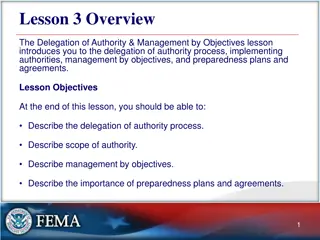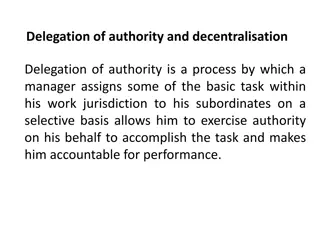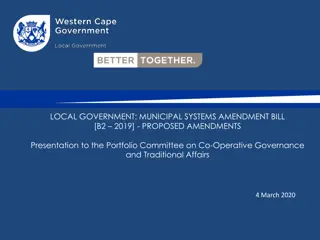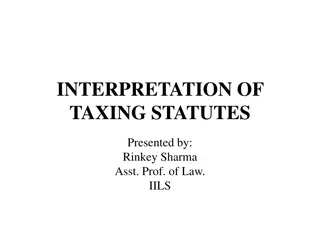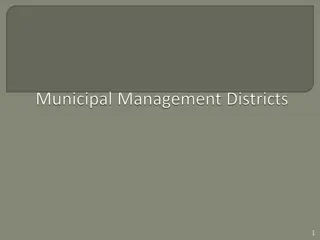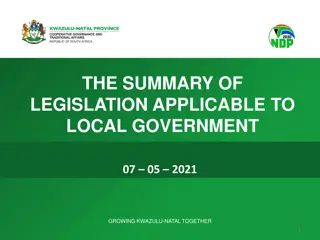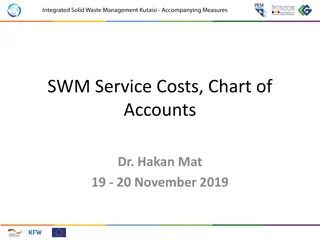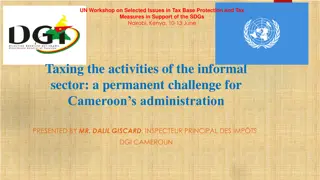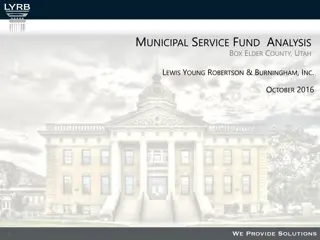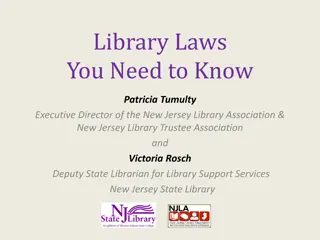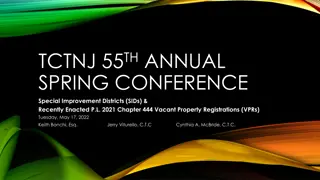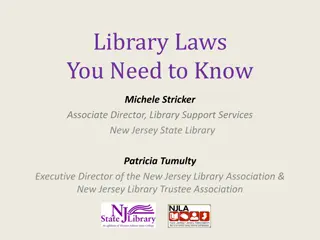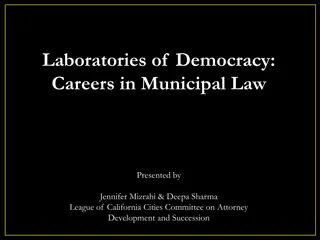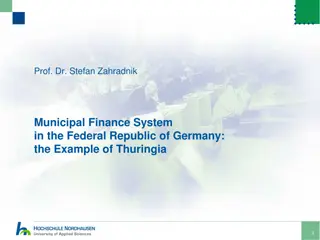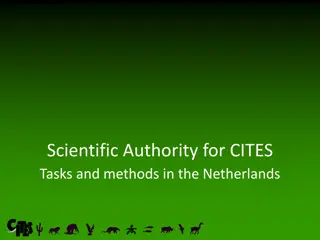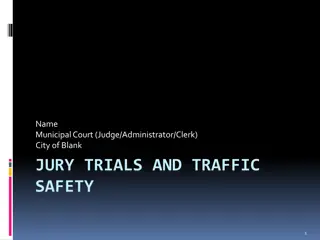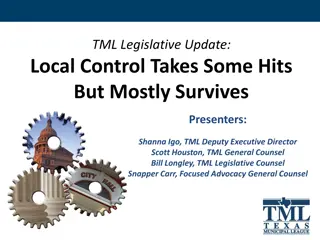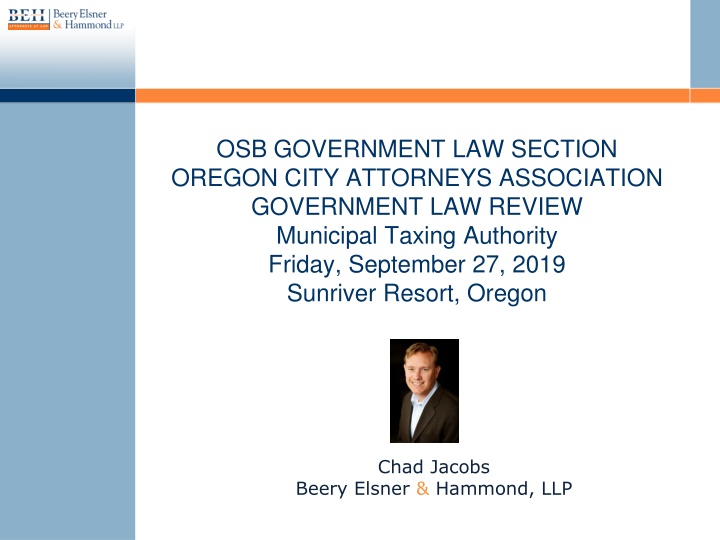
Municipal Taxing Authority in Oregon: Home Rule vs. Preemption
Explore the nuances of municipal taxing authority in Oregon, focusing on the distinctions between home rule charters and preemptions. Learn about the types of municipal organizations and the statutory authorizations that govern their tax imposition abilities. Delve into the analysis process and the significance of charter authorization in determining municipal taxation authority.
Download Presentation

Please find below an Image/Link to download the presentation.
The content on the website is provided AS IS for your information and personal use only. It may not be sold, licensed, or shared on other websites without obtaining consent from the author. If you encounter any issues during the download, it is possible that the publisher has removed the file from their server.
You are allowed to download the files provided on this website for personal or commercial use, subject to the condition that they are used lawfully. All files are the property of their respective owners.
The content on the website is provided AS IS for your information and personal use only. It may not be sold, licensed, or shared on other websites without obtaining consent from the author.
E N D
Presentation Transcript
OSB GOVERNMENT LAW SECTION OREGON CITY ATTORNEYS ASSOCIATION GOVERNMENT LAW REVIEW Municipal Taxing Authority Friday, September 27, 2019 Sunriver Resort, Oregon Chad Jacobs Beery Elsner & Hammond, LLP
Introduction and Overview I am not a tax expert! But this is not a tax presentation. In essence, this is a home rule and preemption discussion. Warning! The materials included here are not exhaustive but rather examples other preemptions and limitations exist, which we will not discuss today.
Does Municipal Taxation Authority Exist? Does municipal taxation authority even exist? It depends on the type of municipal organization and its statutory authorization.
Municipal Authority In Oregon, we generally have three types of municipal organizations: Counties, Cities, and Districts. The ability of a municipal organization to impose a tax depends upon the authority granted to it by the voters or the legislature. Home Rule Charter Statutory Authorization Even then, such authority may be preempted by state or federal law.
Municipal Taxing Authority Analysis Analysis of municipal taxing authority is basically a two-step process Identify Authority: (Home Rule Charter or Statutory) Research & Analyze Preemptions Answer
Charter Authorization Home Rule Cities and Counties can usually look to the general grant of authority in their charters for authorization. SeeJarvill v. City of Eugene, 289 Or. 157 (1980); Multnomah Kennel Club v. Dep't of Revenue, 295 Or. 279, 281, (1983). General Grant of Authority: Model Charter Section 2.1 The city has all powers that the constitutions, statutes and common law of the United States and Oregon expressly or impliedly grant or allow the city, as fully as though this charter specifically enumerated each of those powers.
Charter Authorization Need to examine exact language of charter: Washington County Charter Section 20: The County shall have authority over matters of County concern, to the full extent granted or allowed by the Oregon Constitution and laws of the State, as fully as if each power comprised in that general authority were specifically granted by this Charter. Such power shall include, but shall not be limited to: (a) Levying and collecting of taxes for general and special County purposes. An ordinance creating or imposing a tax or increasing an existing tax shall not be implemented or collected until referred to the electors. In addition, any portion of a taxing ordinance requiring the automatic termination of a tax shall not be repealed by the Board unless such repeal is earlier referred to the electors.
Charter Authorization Sometimes, the grant of authority is not broad enough. See Eugene Theatre et al. v. Eugene et al., 194 Or. 603 (1952). Local movie theater challenged the validity of tax on theatrical exhibitions and other public amusements. At that time, the city did not operate under a home rule charter. Instead, it operated under a 1905 charter of authority granted directly by a special act of the legislature that contained limited taxing authority. Thus, the question in that case was whether the power to impose the license fee was within the scope of the powers that were granted by the legislature to the city. The court held that it was not. According to the court, by specifically enumerating in the charter certain types of taxation authority, which did not include the tax in question, the city lacked authority to impose it.
Charter Authorization Sometimes, the grant of authority is not broad enough. See City of Portland v. HomeAway.com, Inc., 240 F.Supp.3d 1099 (2017). If a charter fails to grant certain municipal powers, the city government will have no authority, under the home rule provisions at least, to exercise those powers. Thus, the City s argument that home rule cities have inherent authority to tax and do not need express charter or legislative authorization to do so is incorrect. Charter grants the City all governmental powers ... subject to the limitations prescribed by the constitution and laws of the State. Such a sweeping grant of authority would seemingly include the general ability to tax. In City of Portland v. Portland Gas & Coke, however, the Oregon Supreme Court held that a predecessor to Section 1 102 was not intended to allow the City to tax without limitation or restriction. 80 Or. 194, 156 P. 1070, 1071 (1916).
Statutory Authorization As well as home rule entities, non-home rule entities may also receive authorization from the legislature or voters to impose taxes through statute. For example, ORS 203.035 grants general home rule authority to non-charter counties the governing body or the electors of a county may by ordinance exercise authority within the county over matters of county concern, to the fullest extent allowed by Constitutions and laws of the United States and of this state, as fully as if each particular power comprised in that general authority were specifically listed in ORS 203.030 to 203.075.
Statutory Authorization Districts should look to their principal acts to determine what taxation authority, if any, exists. For example, ORS 267.370 grants statutory authority to mass transit districts to impose an income tax on individuals and businesses.
Municipal Authority Need to make sure authority is as clear as possible Where municipal authority to tax is doubtful, doubt is to be resolved against tax and in favor of taxpayer, but rule of strict construction goes only to power to tax, and once power is established, a more liberal rule applies as to exercise of such power. - Eugene Theatre Co. v. City of Eugene, 194 Or. 603 (1952)
Preemption Even if authority exists it may be taken away
Preemption Once authorization has been determined, the next question is whether state or federal law preempts a municipal authority from imposing a tax generally, in specific amounts, or against a specific person, entity or organization. What follows is a sampling of various preemptions this is NOT an exhaustive list by any means, but rather examples intended to demonstrate how preemption occurs. Research, Research, Research it s the only way to determine whether preemption exists.
Preemption Property tax preemption Oregon Const. Art XI, 11 (Measures 5 and 50). Limits amount of property taxes collected by municipal authorities in several ways: Permanent rate Compression Limited annual growth rate More information available at: https://www.orcities.org/application/files/4015/6115/9506/ LOC_Measure_5__50_Primer9-8-17.pdf
Preemption No local tax on transfer of real property ORS 306.815 A city, county, district or other political subdivision or municipal corporation may not impose, by ordinance or other law, a tax or fee upon the transfer of a fee estate in real property, or measured by the consideration paid or received upon transfer of a fee estate in real property. Statute creates several exceptions including taxes imposed and in effect before March 31, 1997.
Preemption No business tax on real estate brokers ORS 696.365 City or county business license tax. (1) A city or county may not impose a business license tax on or collect a business license tax from an individual licensed as a real estate broker who engages in professional real estate activity only as an agent of a principal real estate broker. Business license tax means any fee paid by a person to a city or county for any form of license that is required by the city or county in order to conduct business in that city or county. See ORS 701.015
Preemption Sin Taxes No local tax on tobacco ORS 323.030 the state has the exclusive right to tax tobacco products. No local tax on lottery tickets ORS 461.560 cities may not impose a tax on the sale of lottery tickets or impose an excise tax on lottery game retailers. No local tax on alcoholic beverages ORS 471.045 and 473.190 the state has the exclusive right to tax alcoholic beverages. Limits on recreational marijuana ORS 475B.345 Local taxes are limited to 3% of the production, processing or sale of recreational marijuana by a retail licensee.
Preemption No local taxes on race meets ORS 462.100 Local jurisdictions may not impose taxes on or measured by income on, and the regulation of, race meets. Race meet means any exhibition of animal racing where the mutuel system is used in conjunction with any race. ORS 462.010
Preemption Taxation of certain federal benefits Oregon Const. Art IX, 9 Benefits payable under the federal old age and survivors insurance program or benefits under section 3(a), 4(a) or 4(f) of the federal Railroad Retirement Act of 1974, as amended, or their successors, shall not be considered income for the purposes of any tax levied by the state or by a local government in this state.
Preemption Emergency Ordinances May Not Be Used When Enacting Taxes Oregon Const. Art. IX, 1a The Legislative Assembly shall not declare an emergency in any act regulating taxation or exemption. Also applies to the referendum powers reserved to the voters of cities and other municipalities. See Advance Resorts of Am., Inc. v. City of Wheeler, 141 Or. App. 166, 177 (1996); Multnomah Cty. v. Mittleman, 275 Or. 545, 555 (1976).
Preemption Limits on privilege taxes ORS 221.515 Maximum rate of 7% on privilege tax charged to telecommunications carriers for use of right-of-way. Does not preempt application of other taxes, such as a business license tax on telecommunications carriers. See AT & T Communications of the Pacific Northwest, Inc. v. City of Eugene, 177 Or.App. 379 (2001).
Preemption In Barnett Bank of Marion County, N.A. v. Nelson, 517 U.S. 25, 33 (1996), the Supreme Court held that federal banking law (National Bank Tax Act of 1923,42 Stat. 1499) preempts state laws that significantly interfere with [a] national bank s exercise of its powers. This preemption typically does not apply to laws of general applicability, including taxation, provided that the law in question is not inconsistent with and only incidentally affect[ed] the deposit taking, real estate lending, and non- real estate lending powers of national banks. 12 C.F.R. 34.4(b) 7.4007(c), 7.4008(e), 7.4009(c)(2) (2005).
Preemption Even if state or federal law does not preempt a tax, beware that the voters may do so at the ballot box! In 2018, Ontario, Oregon sought to impose a 1% local sales tax. They even added a charter amendment to cap the tax at 1% so it couldn t be increased without voter approval. Electors referred the tax to the ballot, and it went down nearly 2-1 (approximately 1,500 to 800). Conversely, the charter amendment capping the tax passed. In 2004, Ontario electors also said no to a 1% sales tax. That year it was defeated by a landslide of 3,566 to 991 of the votes cast.
Examples Portland Business License Tax: Portland's Business License Tax is a net income tax on business activity (including rentals) conducted in Portland. It is used as revenue for the General Fund (police, fire, some parks programs, and general government functions). Portland's Business License Tax is not a regulatory permit fee and does not entitle a taxpayer to engage in business activity not otherwise allowed by federal, state and/or local laws. More information available at: https://www.portlandoregon.gov/revenue/article/216081
Regulatory License or Tax? It is well established that a license imposed for regulatory purposes should not materially exceed the expense of issuing the license, and of necessary inspection and regulation of the business licensed. See Eugene Theatre Co., 194 Or. 603. A tax is any contribution imposed by government upon individuals, for the use and service of the state. A fee, by contrast, is imposed on persons who apply for or receive a government service that directly benefits them. See Rogue Valley Sewer Servs. v. City of Phoenix, 357 Or. 437, 446, (2015) The question is whether the charge is expended for general public purposes, or used for the regulation or benefit of the parties upon whom the assessment is imposed. See id.
Examples Portland Arts Education and Access Income Tax : Portland's Arts Education and Access Income Tax revenues are dispersed to six Portland school districts and to the Regional Arts & Culture Council (RACC). The money helps arts and music teachers for K-5 students and arts programs citywide. The Arts Education and Access Income Tax was approved by Portland voters in the November 6, 2012 general election. It imposes a tax of $35 per year on each City resident 18 years or older who has $1,000 or more of annual income and is in a household above the federal poverty level. More information available at: https://www.portlandoregon.gov/revenue/article/422384
Is this a poll or head tax? A poll or head tax within the meaning of Article IX, section 1a, is one that applies uniformly on a per capita basis, but does not take income, property, or resources into account in any way. The Arts Tax is not a head or poll tax because it is not assessed per capita. In assessing the tax, the City considers a person s income in three distinct provisions: the tax applies only to (l) income exceeding $ 1,000, (2) non-exempt income sources, and (3) income of individuals residing in households with income above the federal poverty guidelines. Taxpayers who are under the age of 18 are also exempt from the tax. The practical effect of the tax is to tax income of certain City residents within a certain income range and is therefore not a poll or head tax. See Wittemyer v. City of Portland, 361 Or. 854 (2017)
Examples Cornelius General Services Fee A general services fee is imposed by the city every month on all utility accounts connected to city utilities. The general service fee is at a uniform rate and based on each residential housing unit or dwelling unit equivalent for that account. (Chapter 13.40 of the Cornelius City Code) All revenues generated by the fee may be used for city general public services including public safety and administration. More information available at: https://www.codepublishing.com/OR/Cornelius/html/ Cornelius13/Cornelius1340.html
Is the utility fee an illegal property tax? Is the fee imposed upon property or upon a property owner? Does the obligation to pay the fee arise only when a person used the utility service. Does the obligation to pay the fee apply to the person responsible for paying the utility charges? Is there a process to lien the property if charges are not paid? See Roseburg School Dist. v. City of Roseburg, 316 Or. 374, 851 (1993) and Knapp v. City of Jacksonville, 342 Or. 268, 272 73, (2007).
Examples Ashland Food and Beverage Tax A five percent tax is collected on all prepared food sold in Ashland. (Chapter 4.34 of the Ashland Municipal Code) Funds collected are used for various mandated purposes, i.e., 25% must be used for parks; 2% may be used for administration; certain amounts through fiscal year 2022 must be used to pay for wastewater treatment plant debt and wastewater capital improvement projects; and any remainder shall be paid into the Street Fund and used for street maintenance and reconstruction. (A different formula applies in fiscal year 2023 and beyond.) More information available at: https://www.ashland.or.us/Page.asp?NavID=9180
Questions Please feel free to call or email with any questions or comments. Chad A. Jacobs (chad@gov-law.com) Beery Elsner & Hammond, LLP 1750 SW Harbor Way, Suite 380 Portland, OR 97201 t (503) 226 7191 | f (503) 226 2348 www.gov-law.com


